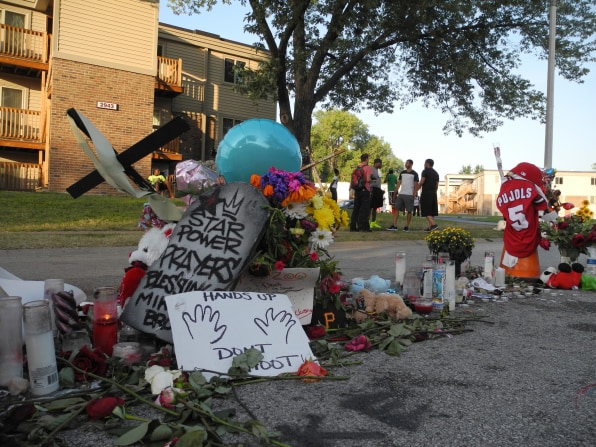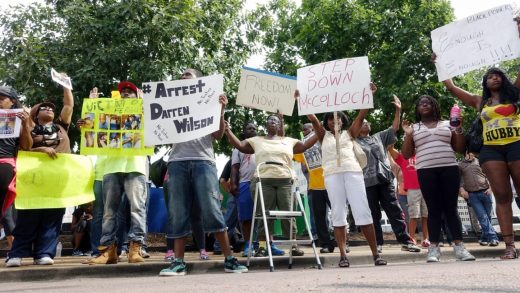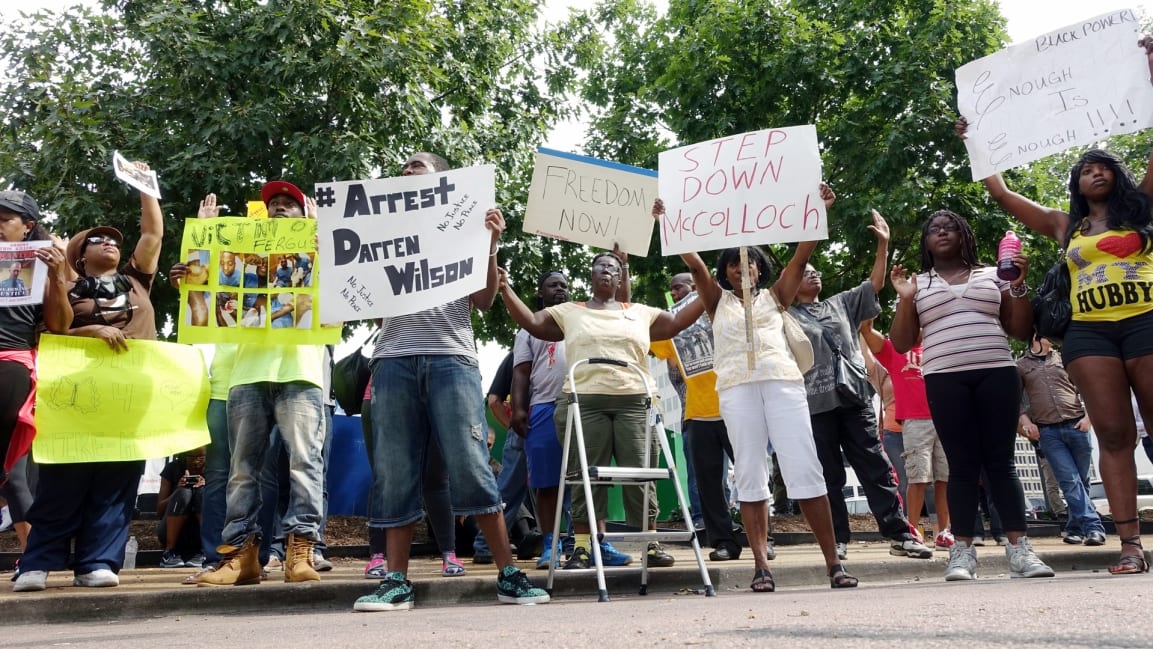Five years after Ferguson, let’s make sure frontline activists don’t become ‘living casualties’
By the time of Michael Brown’s killing, Kayla Reed had dropped out of college and was working as a pharmacy technician in St. Louis, Missouri. Four years later, she was the strategist behind a highly sophisticated grassroots effort to oust the county prosecutor, Bob McCulloch, who failed to indict the officer who killed Brown.
This December, Kayla will graduate with a bachelor of arts degree from Washington University in St. Louis—less than 10 miles from Ferguson. Kayla is one of five leaders of the Ferguson Uprising that returned to college through a pilot project we designed at Washington University. We wanted to answer a simple but profound question: What happens when you fortify movement leaders’ strengths with academic credentials to impact change at scale?
In 2002, coauthor Vernon Mitchell met famed civil rights activist Bob Moses, who is known for his work with the Student Nonviolent Coordinating Committee in the 1960s. Most critically, Moses played an integral role in voter education and registration in Mississippi, organizing sit-ins throughout the South and establishing Freedom Schools. While Moses touched on many topics during his conversation with Vernon, the one that has haunted Vernon for years is what Moses referred to as the living casualties of the civil rights movement: frontline activists who were not household names but endured great trauma during their days organizing and participating in direct action, so much so that it left them unable to return to the life they led before joining the movement. In the wake of the Ferguson Uprising and the other social movements taking place across the country, we risk having another generation of living casualties.
If social movements are comprised of countless individuals, why do we recognize only a handful of names, like those of John Lewis from the civil rights movement, Angela Davis from the Black Panther Party, and DeRay Mckesson and Brittany Packnett from the Ferguson Uprising? Why don’t we know the names and stories of movement leaders similar to Kayla, those who were not ordained by media as acceptable, yet contributed so much to the movement? We established the Center for Movement Leadership to answer those very questions and to support movement leaders as they expand from the front lines to more sustainable opportunities through attending college.

The professionalization of social movement spaces is a paradox, one that is not lost on us. Organizations that advocate against structural inequities on behalf of marginalized communities often have no pathways for those they serve to join the leadership structure. In fact, movement leaders like Kayla are often adjacent to power structures in larger, better-resourced, nonprofit organizations. The requirement for a bachelor’s degree in organizations creates a barrier for many movement leaders who lack the financial resources and academic support structures necessary to enroll and be successful in college. To address this inequity, we need to create a pathway for movement leaders who have a creative mind and commitment to transform their communities, to enroll in college, and simultaneously incubate their best ideas for liberation.
This is exactly the work that the Center for Movement Leadership and our five inaugural movement leaders have proven: Change agents can be successful at a top-tier university, while continuing to contribute to their movements with agility, strategy, and tenacity. Securing opportunities for movement leaders to return to the classroom has turned them into force multipliers, increasing their access and impact.
During Kayla’s time as a full-time student at Washington University, she has convened mayoral debates and organized local election campaigns. She also cofounded the Electoral Justice Project, the Movement for Black Lives, and Action St. Louis, the last of which she currently codirects. Kayla’s work was possible despite being a full-time student through having access to resources, including high-touch holistic academic advising, reliable housing, a work-study position, and health insurance, to name a few.
Equal to her activism work is Kayla’s academic work, making partnership with a university central to a leaders’ continued success. This symbiotic relationship is as much a boon for the university as it is to the movement leaders. It gives Washington University an opportunity to provide educational access to local leaders who are deeply engaged with working through St. Louis’s complex history, which has been well documented in the five years since the Ferguson Uprising. This means Washington University has an active hand in shaping and developing the creative minds that are solving our community’s most pressing challenges.
Leading a movement, organizing campaigns, amplifying the stories of marginalized communities: This is problem-based, experiential learning that makes a difference in the world—immediately, and for years to come. Kayla’s gap year was effectively spent as a movement leader during the Ferguson Uprising, though most universities would not acknowledge it as such or welcome her to their campus as a student. Our movement leaders came to campus with assets and life experiences that have enriched the academic and campus community for all students. Time spent seeking justice in your community, which the university is a part of, should count as much as anything else does in a college application.
Imagine how many more leaders, ideas, and solutions we will have access to from our local and national discourse when we make it possible for movement leaders to return to the classroom, grow their leadership, and incubate their best work. At the Center for Movement Leadership, we don’t want to just imagine that world: We are working to make it real.
Diana Hill Mitchell has a PhD in social psychology and serves as associate dean in the graduate school at Washington University in St. Louis. A cofounder of the Center for Movement Leadership, she is known as @dhillmitchell on Twitter. She and her husband are natives of St. Louis, where they are raising their children.
Vernon C. Mitchell Jr. has a PhD in 20th century American History and teaches courses in American Culture Studies at Washington University in St. Louis. A cofounder of the Center for Movement Leadership, he can be found on twitter @vcmitchelljr. He and his wife are natives of St. Louis, where they are raising their children.
(21)



